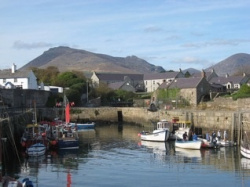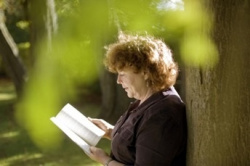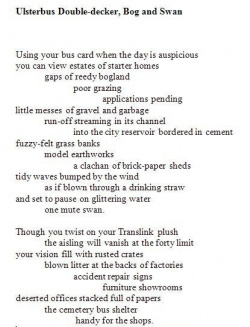Bridges and troubled waters: Graínne Tobin (1)

I’ve reached a point where I can hardly bear to listen to or watch news programmes, when politicians lie effortlessly and without shame, and when total strangers spew bile at each other on what we call, without apparent irony, “social media”.
So I thought it appropriate to devote two posts to a poet I met in the most divided community I’ve ever spent time in, because right now I need all the hope I can get. This first post was originally published on the great fogginzo’s cobweb not long after the result of the referendum. I think it’ll stand another run-out.
There's a Bob Neuwirth song that I can't get out of my head. Venice Beach. It doesn't stand up as poetry. It's sentimental, in the way of good Americana. But I've always loved it, especially the second verse:
Broken promise on the beach, empty feeling heading home
with that sense of being free that's only all alone,
and as the water reached my feet, I looked down into the foam,
and lying just beyond my reach lay a perfect heart-shaped stone.
It does that thing that a good song does, of matching a mood, and putting a tune to it that won't leave you. It's how I felt when I woke up a couple of years ago to find that I wouldn't be a European any more, and nor would my grandchildren. And if this sounds sentimental, I'm not apologising.
In Belfast in the early 80s, for the first time in my life I was stopped by two young squaddies who jumped out of an armoured car and pointed loaded weapons at me, and demanded 'Eye dee'.
I was a visiting tutor for a week at Stranmillis College, and I was walking back from the theatre on my own. I've never got over the culture shock of that week, the business of routinely having bags searched at shop doors, the barbed wire, the breezeblock-defended pub doorways, and, above all, the way everyone went about their business as if it was normal. This is where social and religious and political division will take you.
The course I was tutoring on was in-service for all the heads of English in Northern Ireland. One afternoon I ran an optional poetry workshop (badly enough, but I didn't know better then) and met today's guest poet, Graínne Tobin, who was even younger than me, and who wrote a draft that has always stayed with me. It was about the small town where she lived. It's a Protestant town, and then she was one of the few Catholics in the community. And she was married to an Englishman. The Orange Lodge boys had come round to say they'd be hanging their bunting in the street and on her house. When she told then they couldn't, she was subject to a campaign of menace. Eventually, the bunting was hung up. It was unnerving to finally read a finished version of that draft, earlier this year, 30 years later. The poem is 'Rural retreat' from Banjaxed [2002]. Here's the town.

But I didn't have to live there, and I came home. I kept in touch with Graínne for a time as she set up a Northern Ireland branch of NATE (National Association of Teachers of English), and then life got complicated, as it does, and that was it until three years ago when I met her again in the largely wonderful virtual world of Facebook. She sent me her two poetry collections, and the bilingual anthology she collaborated on, and told me all the amazing things she'd been doing. I fell for the poems, and asked her to be a Cobweb Polished Gem. And here she is to speak for herself, as she always has.
"Gráinne Tobin (she writes) is believed to be mostly harmless. She was born in 1951 in Portadown, in a maternity home which later became the local HQ of the Orange Order .. She was brought up as Catholic but has been an atheist for the last 49 years. She and her parents belonged to the Northern Ireland Civil Rights Movement in its innocent early days.
“At university in Canterbury, she met an English student, Andy Carden, when they were both part of a social action group visiting the high security Borstal in Dover. He became her husband and moved to Ireland with her, against the 1970s flow of people fleeing Northern Ireland for the safety of Britain. Both worked in the education service - Gráinne taught in further and adult education and then in Shimna Integrated College - and are now retired. They have been closely involved in the movement for integrated education and have helped to set up two integrated state schools.
In the 1980s when they had a young child and another on the way, they ran into sectarian trouble in their idyllic-looking fishing village and were under some threat in their home. They have lived since then in Newcastle, Co Down.

Gráinne Tobin’s books are Banjaxed and The Nervous Flyer’s Companion (Summer Palace Press) and she contributed to the Word of Mouth Poetry Collective’s anthology of translations from five St Petersburg women poets, When the Neva Rushes Backwards (Lagan Press).
Her poems have been published in anthologies, and in literary magazines such as Poetry Ireland Review and Magma. She has won the Segora poetry competition in France, was longlisted for the UK’s National Poetry Competition and the Fish Poetry Prize. Her poem, 'Learning to Whistle', was made into a sculpture and is on display in Down Arts Centre."
I would happily sit and read poem after poem to you, relishing their clear-eyed honesty, their range, their verbal and rhythmical sure-footedness. Hearing the voice, like the one in ‘Scabies 1970’ (from The Nervous Flyer's Companion).
The whole town knew someone in the prison -
pinpoints of blood on the children's sheets
were not from hives or the strawberry harvest.
How's that for an opening line? And how's that for the resonances of 'hives' and 'strawberry' … there are two words that really pull their weight. I'm also envious of the way that Graínne can look steadily at atrocity, and its dazed survivors in poems like ‘Bad news from home’ (from Banjaxed)
There's an emptiness in the scattered street
where women wander, talking to the wind,
blood on their faces, looking for each other.
If you're looking for the image that fixes the moment that makes a poem a poem, how about this from 'Mortal sin':
Grown to the age of reason and her first confession
she runs into clean air like a sheet
drying in the wind of absolution.
It's moments like this that always make me think the Irish have the unfair advantages (in poetry) of accent and of Catholicism. But enough. You've waited patiently, and here comes Graínne's selection of her poems, and, which is nice for me, her commentaries on them. Which means I can now put up my feet and just enjoy myself. First up, the seaside.
Happy Days in Sunny Newcastle
The air’s washed now,
last night’s sad leavings
swept up and away.
Van drivers park outside the bakery
with fried eggs held in breakfast soda farls.
Arcades of slot machines
lie berthed between spent streams
that slip downhill to a tideline flagged with pebbles,
faded wood, wrecked loot, rubber gloves, broken glass
abraded to droplets by the tumbling waves.
The daily walker on his coatless course
between youth and age,
observing wading birds and children’s games.
Up for a trip, out for a drive,
dandering down the promenade.
Loudhailer hymns, crusaders’ tracts
warn of strange temptations
offered to ice-cream lickers,
candy-floss lovers.
In the chip-shops’ wake the street
opens to the sea
which is the reason for everything,
shingle bank,
shops and houses,
foundations sunk in marsh,
confined by a shadowed arm
where mountains lift out of the water,
growing darkness like moss
over the forest where the young
roost with beer and campfires.
Heron pacing the harbour at twilight
stiff-collared in clerical grey,
squinting at coloured lights
edging the bay.
Far out, the lighthouse signalling
Good – night
chil – dren.
(Happy Days in Sunny Newcastle was a banner above a local seaside joke and souvenir shop. There is a local eccentric everyone knows, who walks the roads every day in a tweed jacket. And when our son was tiny I used to tell him the lighthouse was flashing goodnight to him through his bedroom window. )
[Me … I love the “sea that is the reason for everything”, the business of Protestant tracts, the textures … at the same time there’s something slightly disturbing going on. And even more so in the next]
Migrant
Tell me a really story. Tell me what it was like
when you were small, which way you walked to school,
the garden where you tried to dig to the other side of the world,
your uncle’s rows of leafy plants to eat,
the orchard tree you climbed to hide,
the old lady waving from the window, the bags of coloured sweets
and the house you were told you’d inherit.
Apricots and lemons.
If you go there, pick some for me.
Tierhogar, Spelga, Qatamon.
The names are spells.
When you shovelled soil aside with your scaled-down spade,
did you know you’d come out where you are now?
That your children would save cereal boxes
to reconstruct your home in sticky-tape and cardboard?
Tell me what happened. Exactly.
(This was written in 2006 well before the current refugee crisis. It was prompted by going to an art exhibition while on a teacher fellowship in Oxford – two women photographers, Israeli and Palestinian Arab. One photographed the family lemon orchard a friend could no longer visit because of travel restrictions on Palestinians. So Qatamon stands for such places. Tierhogar was sold and demolished, my mother’s lost cottage of childhood, for which she always longed. And Spelga is a drowned reservoir-valley near us in Co Down).
The next one nails it for me in one couplet: “In her neat suburb of the dead / you’ll need no A to Zed”:
The Catholic Graveyard in Armagh
Push away the feather quilt,
alert for the small hours review.
Here comes the siren, whoo, whoo,
to rattle your dazed heart.
Now the compulsory tour
of the raw trench where you left her,
wearing her navy dress as waked at home
among chrysanthemums, china cups
and a murmur of rosaries in her own back room.
Neighbours in sequence are addressed
as if they live here: Mrs So-and-So?
Third on the right. The sister and the father
under their slab in the new vernacular,
polished black marble, inscribed in gold,
carried from China for twelve weeks by sea.
She’s two plots away from the tidiest grave in town.
Fresh flowers always, though it took a year
to find a lad his executioners hid.
In her neat suburb of the dead
you’ll need no A to Zed,
killers and killed housed side by side
when booby trap or bullet
levelled their last breath.
Weeds came up over her while your back was turned.
Geraniums from Cemetery Sunday,
candles in plastic holders and a varnished cross
maintain old decency until granite
can name her true and final death.
(My mother’s death left me reeling, and recalibrating everything. I am the only one of seven siblings in Ireland. The rest are in England and Wales. So the day-to-day elder-care, and the funeral and grave arrangements, mostly fell to me. Cruse Bereavement Care helped me to hold on to sanity at the point when I wrote this poem. The title does stick its tongue out at Lowell. That graveyard has the neighbouring corpses of my best friend’s police constable dad and his INLA murderers. Plus everyone else on the Catholic side of the town. It was the subject of a nasty snobby chapter in Kate Adie’s memoir in which she misses several vital points. Cemetery Sunday is when there is a three-line whip on families to clean and decorate graves and stand beside them for an open-air Mass. Ugh! I used to bring my father to attend, beside my mother’s grave in which he would remark that he would also be buried, and after both parents died, my sister heroically came over from England to relieve me of it. Oul’ dacencies can get too much at times.)
It’s not all dark, though it’s always serious. The last one takes you on a bus ride you weren’t quite expecting. Fingers crossed that WordPress will let me keep the layout as it should be. (of course it didn’t. So let’s see what converting to a jpeg will manage. Yayy. It works)

(This was partly prompted by a poet friend’s objection to current Irish poems which ignore modernity in favour of bogs and swans. There is a backlash against all this rural Oirishry, which amuses me, since so many of us really are still rural, but I’m also drawn to the idea of a debunking nature poem.)
So, there we are. Next week we’ll get up to date on what Graínne did next. See you then.






<Deleted User> (5011)
Fri 30th Aug 2019 12:33
I am currently re-reading Edward Hirsch's much-acclaimed How to Read a Poem and Fall in Love with Poetry. (To which his answer is: ecstatically.)
The acclamations focus on Hirsch's comprehesive knowledge of, and unalloyed passion for, poetry. He is like a friend who knows how to draw you into his world, sharing with you his favourite lines of poetry, individual poems and poets, helping you rediscover your passion for the written and spoken word. I am always inspired when reading his book, which I do in short passages, enough to make me want to write, and to learn more about the individual poets, their work and their cultural backgrounds.
In all of the above regards, John Foggin's blog has precisely the same effects on me. Time spent reading it is never wasted.
Thank you, John.